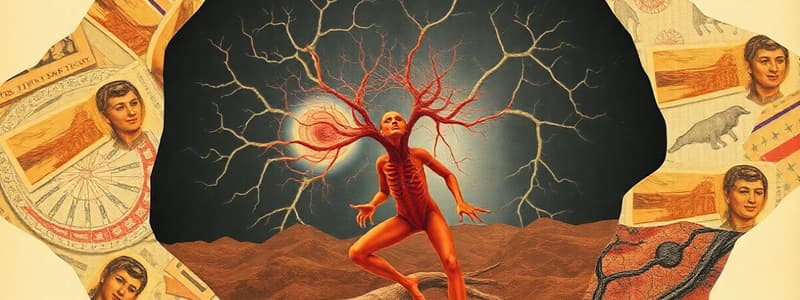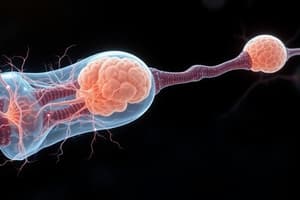Podcast
Questions and Answers
What is the process called that leads to the formation of the central nervous system?
What is the process called that leads to the formation of the central nervous system?
- Neurogenesis
- Neurulation (correct)
- Neural migration
- Neurodevelopment
Where are neural progenitor cells located during the development of the brain?
Where are neural progenitor cells located during the development of the brain?
- Ventricular zone (correct)
- Cortex
- Spinal column
- Notochord
What does the term 'migration' refer to in the context of neural development?
What does the term 'migration' refer to in the context of neural development?
- The differentiation of glial cells from neurons
- The process of cell division in the spinal cord
- The initial formation of the neural tube
- The movement of cells to their final locations in the developing brain (correct)
What is the outcome of successful neurulation in embryonic development?
What is the outcome of successful neurulation in embryonic development?
What is the relationship between neurogenesis and migration?
What is the relationship between neurogenesis and migration?
What is neurulation?
What is neurulation?
What is the role of the Ventricular Zone?
What is the role of the Ventricular Zone?
What does migration refer to in neuroscience?
What does migration refer to in neuroscience?
What are Radial Glia?
What are Radial Glia?
What is a growth cone?
What is a growth cone?
What is apoptosis?
What is apoptosis?
What are neurotrophins?
What are neurotrophins?
What is Nerve Growth Factor (NGF)?
What is Nerve Growth Factor (NGF)?
What is myelination?
What is myelination?
What are critical periods?
What are critical periods?
What genetic disorder is known as Trisomy 21?
What genetic disorder is known as Trisomy 21?
What causes Phenylketonuria (PKU)?
What causes Phenylketonuria (PKU)?
Study Notes
Neural Tube Development
- The neural tube is formed during neurulation, generating the brain and spinal cord, the foundation of the central nervous system.
- Neurulation, the developmental process of the neural tube formation, is critical for proper nervous system development.
Ventricular Zone
- The ventricular zone is a region within the neural tube that houses the neural progenitor cells, which give rise to both neurons and glial cells.
Migration
- Neuron migration happens after the formation of the neural tube and is crucial in neurogenesis, the process of developing the nervous system.
- The movement of neurons and other cells from their origin to their final location in the developing brain and spinal cord is called migration.
Neural Tube Development
- The neural tube develops into the central nervous system (CNS), which includes the brain and spinal cord.
- Neurulation is the process of forming the neural tube.
Ventricular Zone
- The ventricular zone is located in the developing brain within the neural tube.
- Contains neural progenitor cells, which give rise to neurons and glial cells.
Migration
- Neurons and other cells move from their origin to their final locations in the brain and spinal cord.
- This process is crucial for neurogenesis and occurs after the formation of the neural tube.
Radial Glia
- Radial glia are glial cells that act as scaffolding for migrating neurons.
- They also serve as progenitor cells, giving rise to different cell types in the brain.
Growth Cone
- The growth cone is a motile structure at the tip of an axon that helps it navigate environmental cues.
- It’s responsible for axon growth during development.
Apoptosis
- Programmed cell death is a regulated process that eliminates cells in a controlled manner.
- It's essential for development, tissue homeostasis, and removing damaged or harmful cells.
Neurotrophins
- A family of proteins that play a crucial role in neuron development, survival, and function.
- They affect the growth, differentiation, and maintenance of neurons and glial cells.
- They influence neural plasticity and repair.
Nerve Growth Factor (NGF)
- A neurotrophin essential for neuron survival, development, and function.
- It was the first discovered neurotrophin.
Myelination
- The formation of a myelin sheath around axons of neurons.
- Myelin is a fatty substance that insulates axons, enhancing the speed and efficiency of neural signal conduction.
Critical Periods
- Specific developmental time frames where the nervous system is highly sensitive to environmental stimuli.
- Learning, development, and maturation must occur during these periods for normal function later in life.
- If specific experiences are missed during these critical windows, permanent effects on development and behavior may result.
Trisomy 21 (Down Syndrome)
- A genetic disorder caused by an extra copy of chromosome 21.
- It manifests in a range of physical and developmental features, as well as health issues.
Phenylketonuria (PKU)
- A genetic disorder resulting from a deficiency in the enzyme phenylalanine hydroxylase (PAH).
- PAH converts phenylalanine into tyrosine.
- Untreated PKU leads to a buildup of phenylalanine, causing serious health problems, especially affecting the brain.
Studying That Suits You
Use AI to generate personalized quizzes and flashcards to suit your learning preferences.
Description
Test your knowledge on neural tube development, the ventricular zone, and the migration of neurons. This quiz covers key concepts in neurogenesis, crucial for understanding the formation of the central nervous system. Explore how these processes interplay to shape brain and spinal cord development.




